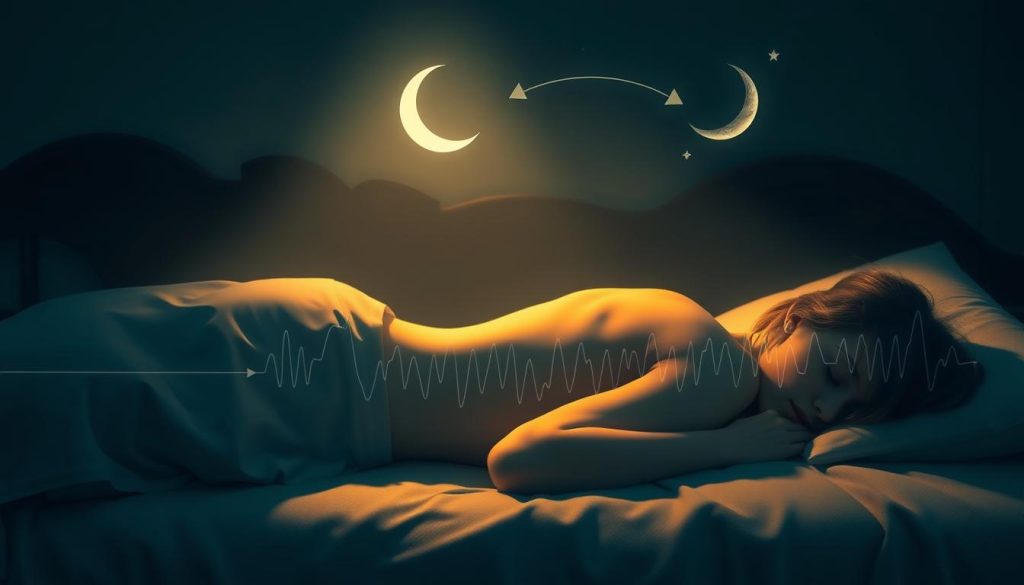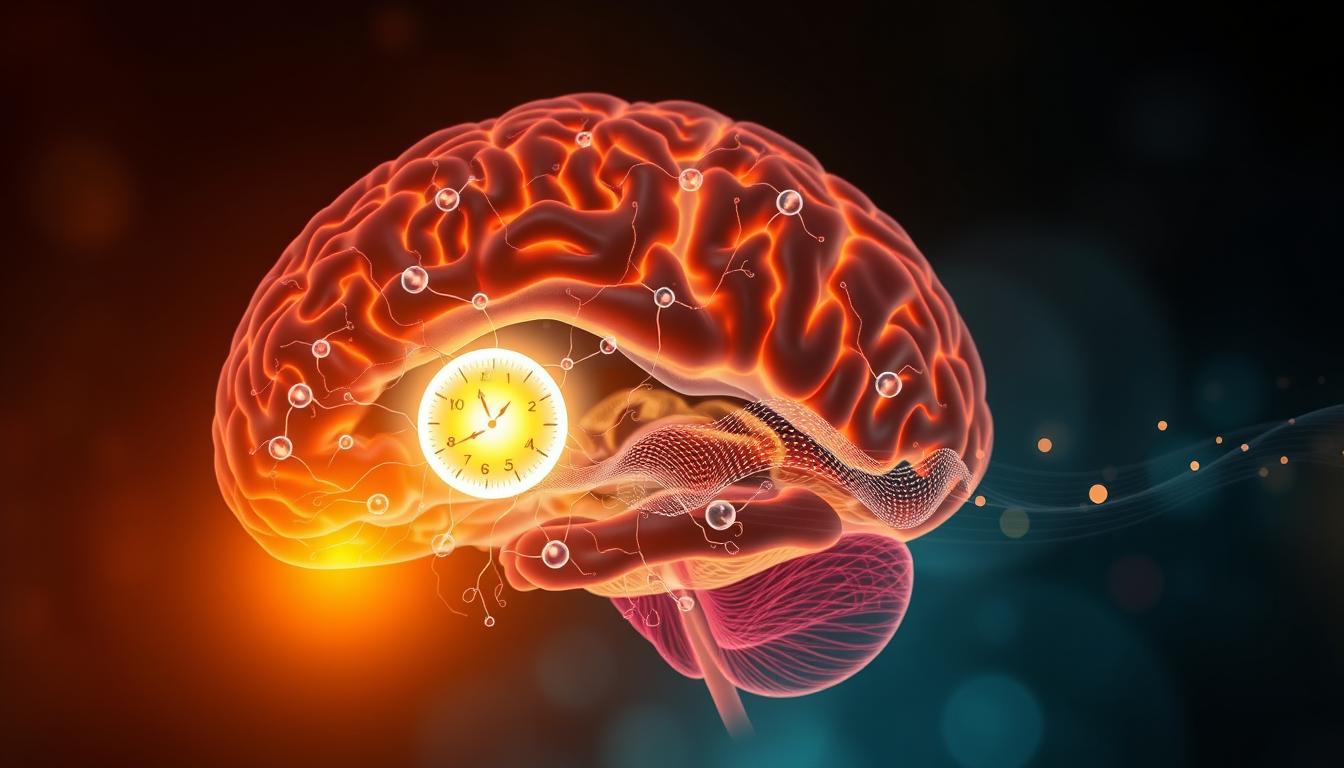Your body has an internal timer that never stops. This natural timing system, called your circadian rhythm, controls when you feel alert, sleepy, hungry, and energized. It works through each 24-hour period.
Many people don’t know how much their biological clock affects their well-being. It doesn’t just manage sleep patterns. It also influences your mood, energy levels, and mental performance.
Working against your body’s natural timing can make you feel tired, stressed, or unfocused. But, when you align your activities with your internal clock, things get easier.
Learning about chronobiology can change how you approach your day. Making simple changes to your eating, exercise, and work schedule can boost your productivity. Your body already knows the best times for different activities.
Understanding Circadian Rhythm
Deep in your brain, a biological clock works all day. It controls when you’re alert, your body temperature, and digestion. This study, called chronobiology, shows how our bodies keep perfect time.
Your body’s clock doesn’t work alone. It gets signals from the world to stay in sync. These cues help your body adjust to seasons and keep healthy sleep patterns.
What is Circadian Rhythm?
Circadian rhythm is your body’s 24-hour cycle for sleep, wake, and body functions. It’s called “about a day” in Latin. Your body’s clock manages hormone release and cell repair.
This clock works on its own, even without outside help. Scientists proved this by keeping people in dark rooms without clocks. Still, their bodies kept a 24-hour cycle.

Your body’s rhythm affects more than sleep. It changes your temperature, blood pressure, and mood. Knowing these changes can help you live better.
The Science Behind Your Body’s Clock
Your body’s master clock is in the brain. It’s a small group of neurons in the hypothalamus. It gets signals from your eyes and adjusts to light and dark.
Zeitgebers, or “time-givers,” reset your clock every day. Light is the strongest, but food, exercise, and social time also play a part. These cues keep your rhythm in sync with the day.
Your genes decide if you’re a morning person or night owl. Scientists found “clock genes” that drive your rhythm. These genes work together to keep your body on schedule.
Hormones like melatonin and cortisol follow a daily pattern. Melatonin helps you sleep, and cortisol wakes you up. This hormonal dance keeps your energy up all day.
Importance of Circadian Rhythm in Daily Life
The circadian rhythm is more than just sleep schedules. It affects your body’s systems, like hormone production and brain function. When it’s in sync, you feel more energetic, happier, and healthier.
But, modern life often messes with this natural rhythm. Work hours, artificial lights, and screens can upset your body’s clock. This messes with your energy levels and how well you perform during the day.
Knowing your circadian rhythm helps you make better choices. You can plan meals, exercise, and work to match your body’s natural rhythms. This improves your productivity and health.
Sleep Quality and Timing
Your circadian rhythm controls your sleep through hormones and brain signals. When it works right, you sleep well and wake up feeling refreshed. Light and daily activities influence these signals.
Melatonin, the sleep hormone, rises in the evening. But, blue light from screens can stop it from rising. This makes it hard to fall asleep.

Sticking to a sleep schedule strengthens your circadian rhythm. Going to bed and waking up at the same time each day helps. This improves your sleep quality and keeps it healthy over time.
Poor alignment with your circadian rhythm can cause sleep problems. You might find it hard to fall asleep, wake up a lot at night, or feel groggy in the morning. These issues often come from not matching your sleep timing.
Mental and Emotional Well-being
Your circadian rhythm is key to your mental health. Studies link disrupted clocks to mood disorders, anxiety, and depression. A stable rhythm helps you feel emotionally balanced.
Hormones like cortisol and melatonin change throughout the day. Cortisol makes you alert in the morning. Melatonin helps you relax in the evening. These changes affect your mood.
Cognitive function also follows your circadian rhythm. Most people are most alert in the morning and early evening. Knowing this helps you plan your tasks for when you’re most focused.
Keeping a consistent circadian rhythm is good for your mental health. Regular sleep, light, and routines help you stay emotionally stable and resilient.
The Role of Natural Light
Sunlight is like a master switch for your daily energy. Your body has evolved to respond to natural light. It helps control hormone production and body temperature.
Think of natural light as your body’s personal trainer. It tells your internal clock when to be alert and when to relax. Without enough light, your body can get confused and out of sync.

Benefits of Sunlight Exposure
Getting enough sunlight is great for your health. Your body makes vitamin D from UV rays. This vitamin is key for strong bones, a healthy immune system, and a good mood.
Sunlight also helps keep your cortisol levels in check. Morning light boosts cortisol, giving you energy. As the day goes on, cortisol levels drop, helping you sleep better.
Sunlight can also make you feel happier. It boosts serotonin in your brain. This helps fight depression and anxiety.
Here are the main benefits of sunlight:
- Stronger bones from vitamin D
- Improved mood from serotonin
- Better sleep from melatonin
- A stronger immune system
- Less risk of seasonal depression
Ways to Maximize Natural Light Intake
You don’t need big changes to get more sunlight. Simple tweaks to your day can make a big difference. The goal is to make light a part of your daily routine.
Start your day with bright light. Open curtains or take a short walk outside. This helps set your body’s energy levels.
Make your workspace bright if you work indoors. Sit near a window if you can. If not, use a light therapy lamp in the morning.
Take breaks outside during work. Even short walks help. Try to spend at least 30 minutes outside each day, especially at lunch.
Here are some easy ways to get more sunlight:
- Open blinds and curtains right when you wake up
- Eat breakfast by a sunny window
- Take calls while walking outside
- Use light therapy lamps on cloudy days
- Plan outdoor activities when the sun is out
Remember, it’s the little changes that add up. Small steps in your light exposure can make a big difference over time.
How to Align Your Daily Routines
Aligning your daily activities with your body’s natural rhythms boosts productivity and health. Working with your circadian rhythm improves energy levels. Making small, consistent changes supports your internal clock.
Understanding your personal chronotype and energy patterns is key. Some people feel most alert in the morning, others later. Recognizing these patterns helps structure your routine for maximum energy.
Tips for Syncing Your Schedule
Start by identifying your peak performance times. Track your energy for a week to find when you’re most alert. Schedule important tasks during these times.
Do demanding work during your natural peak hours, usually 9 AM to 11 AM. Save routine tasks for lower-energy periods. This reduces stress and boosts productivity.
- Schedule creative work during your peak alertness hours
- Plan meetings and social activities when your energy naturally dips
- Set consistent meal times to support your body’s internal clock
- Create buffer time between high-energy activities
- Avoid scheduling important decisions during your low-energy periods
Consistency is crucial when developing new habits. Start small and gradually add more. Your body needs time to adjust, so be patient.
Morning Rituals for a Fresh Start
Your morning routine sets the tone for the day. It’s vital for regulating your circadian rhythm. A good morning ritual signals to your body that it’s time to be alert.
Start with natural light exposure within the first hour of waking. Open curtains or step outside briefly. This helps reset your internal clock.
Hydration is key in the morning. Drink a glass of water to kickstart your metabolism. Your body loses water at night, so replenishing it makes you feel more alert.
Incorporate gentle movement to boost circulation and energy. Simple stretching, yoga, or a short walk works well. Movement increases body temperature and signals to your brain that it’s time to be active.
Consider adding these elements to your morning ritual:
- Expose yourself to natural light within 30 minutes of waking
- Drink water to rehydrate your body
- Practice 5-10 minutes of gentle movement or stretching
- Eat a balanced breakfast to fuel your day
- Avoid checking your phone for the first 30 minutes
The best morning routine is one you can stick to. Start with one or two elements and add more as they become automatic. Your circadian rhythm will thank you, and you’ll notice improved energy and mood.
The Impact of Technology on Circadian Rhythm
The digital revolution has changed our lives for the better, but it also has its downsides. Our constant use of screens can mess with our sleep patterns. It’s important to understand how technology affects our sleep-wake cycle for better health.
Devices emit artificial light that tricks our bodies. This can make it hard to fall asleep and reduce sleep quality. The effects are not just about feeling tired the next day.

Blue Light and Sleep Disruption
Blue light is especially bad for our sleep. It’s in the shorter wavelengths and can stop our bodies from making melatonin. Using devices in the evening tells our brains it’s still day.
This can make it hard to sleep well. Melatonin helps us fall asleep and stay asleep. Without enough, we struggle to sleep and may wake up a lot during the night.
When we use blue light close to bedtime, it can delay sleep. This doesn’t just affect when we go to bed. It also hurts the quality of our REM sleep, which is key for memory and emotions.
Common sources of blue light include:
- Smartphones and tablets
- Computer monitors and laptops
- LED televisions
- Energy-efficient LED light bulbs
- Gaming devices and consoles
Strategies to Reduce Screen Time
We don’t have to give up technology to protect our sleep. Making small changes can make a big difference. The goal is to find ways that fit our busy lives.
Start with a digital sunset routine. Lower screen brightness and use devices less as bedtime nears. Many find success with a “no screens” rule an hour or two before bed.
Here are some ways to manage screen time in the evening:
- Use blue light filtering apps or night mode settings
- Wear blue light blocking glasses in the evening
- Have a charging station outside the bedroom
- Replace screen time with relaxing activities like reading or stretching
- Use warmer lighting in the evening
Technology can also help. Many devices have blue light filters that turn on at sunset. These features can lessen the impact of evening screen use.
Consistency is key, not perfection. Even small cuts in screen time can improve sleep and energy. Start with one or two changes and build healthier habits over time.
Nutrition and Circadian Rhythm
Your body’s internal clock doesn’t just control sleep and wake cycles. It also affects how your digestive system processes food. The timing of your meals is key to supporting or disrupting your natural rhythm and daily routines. When you eat is as important as what you eat for optimal health.
Your digestive system has its own schedule. Enzymes, hormones, and metabolic processes change based on your internal clock. This means your body is better at handling food at certain times of the day.
Eating in sync with your circadian rhythm can improve digestion, boost energy, and enhance sleep quality. On the other hand, poor meal timing can make you feel sluggish.
Meal Timing for Optimal Health
Chrono-nutrition focuses on when you eat, not just what. Your metabolism is highest in the morning and afternoon, making these ideal for larger meals. This explains why breakfast is called the most important meal of the day.
Eating a big breakfast starts your metabolism and gives you energy all morning. Your body makes more insulin and digestive enzymes then, making it easier to process nutrients.
Time-restricted eating is popular for supporting your circadian rhythm and daily routines. It means eating all meals within 8-12 hours. Many people eat between 7 AM and 7 PM, letting their digestive system rest at night.
- Eat your largest meal during midday when metabolism peaks
- Keep dinner light and finish eating 3 hours before bedtime
- Maintain consistent meal times to reinforce your body’s natural rhythm
- Avoid late-night snacking, which can disrupt sleep quality
- Stay hydrated throughout the day but reduce fluids before bed
Late-night eating is hard on your circadian rhythm. Eating close to bedtime makes your body focus on digestion instead of sleep. This can lead to restless nights and morning grogginess.
Your body temperature naturally drops in the evening to signal sleep. Heavy meals raise your core temperature, making it hard to fall asleep. Light evening meals help your body transition to rest mode.
Effects of Caffeine on Your Body Clock
Caffeine affects your circadian rhythm more than you think. It blocks adenosine, a chemical that makes you feel tired. Morning caffeine can wake you up, but late caffeine can disrupt your sleep-wake cycle.
The timing of your caffeine intake is crucial. Your body’s cortisol levels, a natural alertness hormone, are highest between 8-9 AM. Drinking coffee then can reduce its effectiveness and increase your tolerance.
The best time for caffeine is between 9:30 AM and 11:30 AM, when cortisol levels naturally dip. This timing maximizes caffeine’s benefits while working with your body’s natural rhythm.
Afternoon caffeine is the biggest challenge for maintaining healthy circadian rhythm and daily routines. Caffeine’s half-life is 5-6 hours, meaning it stays in your system long after you drink it. A 2 PM coffee can still affect your sleep at 8 PM.
Consider these guidelines for managing caffeine intake:
- Stop consuming caffeine after 2 PM to protect nighttime sleep
- Limit total daily intake to 400mg (about 4 cups of coffee)
- Wait 90 minutes after waking before your first cup
- Choose green tea over coffee for a gentler caffeine boost
- Gradually reduce intake if you want to reset your sensitivity
For those looking to reduce caffeine dependence, gradual reduction is better than stopping abruptly. Cut back by 25% each week to avoid withdrawal symptoms like headaches and fatigue. Replace some caffeine with natural energy boosters like exercise, sunlight exposure, and proper hydration.
Alternative beverages can help maintain your routine without disrupting your sleep cycle. Herbal teas, decaf coffee, and sparkling water provide comfort and ritual without the stimulating effects. Many people find that improving their overall sleep quality reduces their need for caffeine throughout the day.
Exercise and Your Body’s Clock
Exercise is a key player in keeping your circadian rhythm in check. It creates a natural bond between movement and your body’s internal clock. This bond is two-way: your body’s timing affects when you’re best for workouts, and regular exercise strengthens your sleep-wake cycle.
Regular exercise teaches your body to expect these activity times. This creates a loop that supports healthy circadian patterns. Your muscles, heart rate, and body temperature follow predictable rhythms that can be improved with strategic workout timing.
Best Times to Work Out
Your body’s natural energy levels peak and dip at different times. Most people are at their most energetic between 6 AM and 10 AM. This makes morning a great time for cardio and strength training.
Afternoon workouts, from 2 PM to 6 PM, are also excellent. Your body temperature peaks during this time, boosting muscle function and reducing injury risk. Your reaction time and how hard you feel the workout also improve.
Evening workouts can be good, but timing is key. Finish intense exercise at least 3 hours before bed to avoid disrupting sleep. Light activities like yoga or stretching near bedtime can help you sleep better.
- Morning workouts: Best for fat burning and establishing routine
- Afternoon sessions: Optimal for strength and performance
- Early evening: Good for stress relief and flexibility
- Late evening: Avoid intense exercise within 3 hours of sleep
Benefits of Regular Physical Activity
Regular exercise is a strong zeitgeber, anchoring your circadian rhythm and daily routines. It boosts your biological clock signals, making your sleep-wake cycle more stable and predictable.
Exercise improves sleep quality by promoting deeper, more restorative sleep. Those who work out regularly fall asleep faster and wake up fewer times at night. This creates a cycle where better sleep means more energy for exercise.
Exercise also regulates hormone production throughout the day. The timing of your workouts affects cortisol, growth hormone, and melatonin levels. These hormonal changes help regulate your mood and energy levels.
Even light physical activity, like a 20-minute walk during the day, can greatly improve your circadian health. It reinforces your natural rhythms and boosts overall well-being.
Adjusting Circadian Rhythm for Shift Work
Shift workers face unique challenges in keeping a healthy circadian rhythm and daily routines. Working against your natural body clock can feel like swimming upstream. But, there are practical strategies to help reduce its impact on your health and well-being.
Challenges Faced by Shift Workers
Night shift workers often struggle with sleep disorders, digestive problems, and mood changes. Your body naturally wants to sleep when it’s dark and stay awake during daylight hours. Fighting this natural pattern can lead to chronic fatigue and difficulty concentrating.
Many shift workers also face social isolation since their schedules don’t align with family and friends. The constant battle against your internal clock can increase stress levels and affect your immune system. These challenges are real and shouldn’t be ignored.
Techniques for Better Sleep Quality
Strategic light exposure can help reset your body clock. Use bright lights during your work hours and wear sunglasses on your way home. Create a dark, cool sleeping environment with blackout curtains and white noise machines.
Plan short naps before your shift starts, but avoid long naps that might interfere with your main sleep period. Stick to consistent sleep and wake times, even on days off. This helps maintain your adjusted circadian rhythm and daily routines.
Communicate with family members about your sleep schedule so they can support your rest time. Small changes can make a big difference in how you feel and perform.

